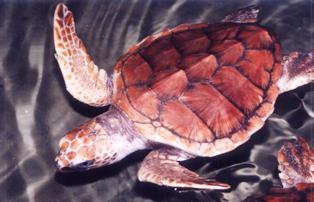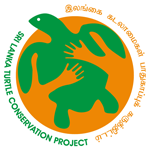

Scientific Name
Caretta caretta

Conservation status
Vulnerable

Population
Declining

Average lifespan
70 – 80 years

Average adult weight
90 – 180 Kgs

Average adult size
0.7 – 1 meter

Biogeographic realm
New England/Mid-Atlantic, Pacific Islands, Southeast, West Coast, Indian Ocean
This species nests on tropical beaches and also on beaches in some temperate locations such as the Mediterranean and the South-East coast of the U.S.A. Although this species is one of the commonest species in the world, it is the rarest nesting species in Sri Lanka. From the Indian subcontinent, they only nest in Sri Lanka and they show unique coloration suggesting a unique population with unique genes. Loggerheads are primarily carnivorous and feed on mollusks and crustaceans. The name “Loggerhead’’ refers to the large head which accommodates a large, muscular set
of jaws, ideal for crushing mollusks and crustaceans. They have a heart-shaped reddish-brown carapace, with a yellow underbelly. Once reach sexual maturity, female loggerhead turtles lay two to five clutches per of up to 130 eggs per season. The fisheries industry poses the greatest threat to the loggerhead populations by increasing the number of by-catches, vessel strikes, and entangled in ghost nets. Further, their population is threatened by egg poaching and killing for meat in certain regions.

